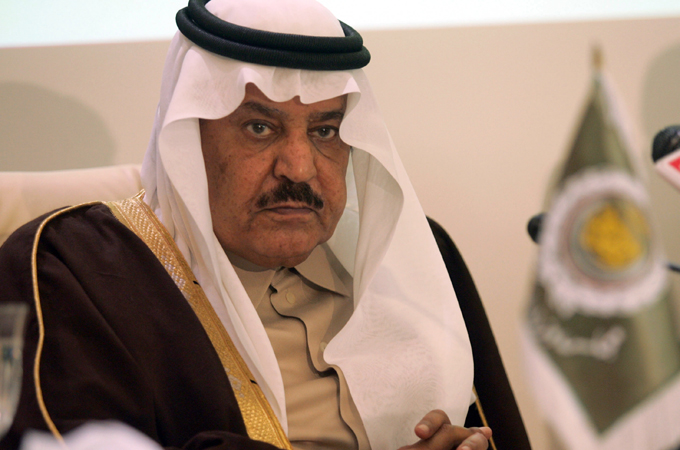Heir’s death opens Saudi succession question
The choice of King Abdullah’s successor will come after intricate familial politics in the Gulf monarchy.

The death of Crown Prince Sultan bin Abdul-Aziz Al Saud raises a novel issue for the conservative, oil-rich Gulf monarchy of Saudi Arabia: how to pick a new heir apparent.
The kingdom has previously been rocked by turmoil within the ruling family, including the peaceful overthrow of one king and the assassination of another, but power usually passes to a designated crown prince, and never before has the crown prince passed away or otherwise given up his claim.
Though many believe the new successor will likely be Prince Nayef, Sultan’s brother and the interior minister, the ultimate decision will come only after political machinations within a newly made council, a seal of approval from the country’s religious leaders and a decision from King Abdullah, a half-brother, whose own assumption of the throne reportedly went against the wishes of Sultan and Nayef’s branch.
King Abdullah named Sultan crown prince and made him deputy prime minister after assuming the throne on August 1, 2005, after the death of Sultan’s brother, King Fahd. Fahd had made Abdullah his crown prince, a decision that reportedly irked those who wanted to see Sultan come next.
Familial politics
Abdullah’s reign has witnessed two important succession-related decisions. In 2006, he decreed the formation of a 34-member Allegiance Council that seemed to have responsibility for approving new kings and crown princes, but in 2009, he named Nayef to the role of second deputy prime minister, apparently positioning him to succeed Sultan.
Under the rules forming the council, the king presents three candidates to be his successor. If he and the council disagree over the final choice, the council votes.
The council was only meant to begin making decisions after Sultan had succeeded Abdullah. It will now be put into action sooner than expected.
 |
| Prince Nayef was reportedly involved in the decision to send Saudi troops to Bahrain earlier this year [EPA] |
Since the king has ultimate authority, even to abolish the council, he could theoretically set aside their decision, though in practice royal decisions are often constrained by intricate familial politics.
The council is made up of the surviving sons of Saudi Arabia’s founding king, Abdul-Aziz bin Saud, as well as the eldest sons of his deceased brothers and the sons of the king and crown prince.
The princes could refuse to approve Abdullah’s choice as crown prince, though since Nayef appears to be in line for that position, such a conflict is unlikely.
Abdullah “would find himself under enormous pressure from his senior brothers to appoint [Nayef] as crown prince” if Sultan died, wrote Simon Henderson, a fellow at the Washington Institute and former journalist who has examined Gulf politics, in a 2009 paper.
But, Henderson noted, “the picture is complicated by the advanced age and poor health of Saudi Arabia’s senior princes … the lack of knowledge regarding how the remaining sons of Ibn Saud will form a consensus, and the unknown extent to which the newly formed Allegiance Council will have a role”.
In an October 2009 diplomatic cable from the US embassy in the Saudi capital Riyadh, Ambassador James Smith wrote that it was “unlikely” Abdullah would ignore the Allegiance Council, “since its members constitute the core of the kingdom’s collective leadership, and it has the status of the kingdom’s other constitutional laws”.
Nayef as king?
Among the contenders, Smith wrote, the “best-placed” candidate was Prince Nayef, who has served as interior minister since 1975. Nayef belongs to the so-called “Sudairi Seven” – the powerful surviving sons of King Saud and one of his wives, Hissa al-Sudairi, a group which included Sultan. Only five of the seven remain after Sultan’s death.
Nayef is 77 and reportedly dealing with health problems. During a November 2010 news conference in Mecca, Henderson noted, journalists observed that he “depended on aides to help him answer questions”.
Nevertheless, he has overseen an aggressive security campaign in the wake of the September 11 attacks on the United States, in which 15 of the 19 hijackers were Saudi citizens, and is typically viewed as a conservative in an already tightly controlled and strictly Wahhabi Muslim country.
He was reportedly deeply involved in Saudi Arabia’s decision to send troops to put down a widespread, Shia-based protest movement in neighbouring Bahrain and made statements accusing Iran of instigating the movement.
Yet Nayef also approved a 2001 decision to issue identity cards to women for the first time. Previously, women were registered only on their father’s or husband’s identity card. Having their own enabled women to more easily make financial, legal and social transactions, and Nayef publicly supported the effort.
During times when Abdullah or Sultan have been indisposed, Nayef has led cabinet meetings, and he assumed primary responsibility for the country’s “tougher” approach towards fighting Houthi rebels in Yemen, according to another 2009 US cable.